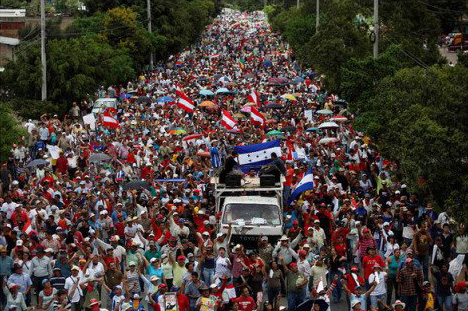All kinds of manoeuvres are taking place after the coup in Honduras. The coup organisers want to hold on, but pressure is being brought to bear for some kind of compromise solution, which however cannot satisfy the masses. The only real answer lies in the full mobilisation of the Honduran workers and peasants (06/07/2009).
On Sunday, July 5, a week after having been removed by a military coup, Honduran president Mel Zelaya boarded a Venezuelan plane in Washington with the aim of going back to his country. Hundreds of thousands had marched to the Toncontin airport and broken through police lines to make sure his plane could land. However, the army opened fire on the unarmed demonstrators, injuring scores and killing at least one. Zelaya’s plane was prevented from landing by the Army which positioned vehicles on the landing strip. The government of Micheletti ‑ imposed by a coup ‑ has closed down all of the country’s airports.
Men, women, children, workers, peasants, the poor, had gathered from early in the morning to march to the airport to receive their president. A report from Radio Globo put the figure at half a million, others put the number at 200,000 people. The live broadcast from Telesur showed a huge crowd of hundreds of thousands, far bigger than the 65,000 that had marched against the coup the day before in Tegucigalpa. Speaking from Honduras to In Defence of Marxism, Democratic Unity (UD) party MP Tomás Andino said: “This demonstration was unprecedented, probably the largest in the history of Honduras”. We have to take into account that the population of the country as a whole is only 7.5 million people. This demonstration was the biggest so far against the coup and dwarfed any of the demonstrations organised by the coup plotters during the week.
This massive movement of the people of Honduras has taken place despite the fact that the new regime has imposed a curfew (which has now been extended and is in place between 6pm and 6am every night), has arrested dozens of known trade union and popular movement activists and leaders, has killed a number of them (the correspondent from El Pais has reported that people have been taken to hospital by the police with bullet wounds every single night), has suspended constitutional guarantees (a de facto state of emergency situation) and put in place a media blockade (a number of radio and TV stations have been closed down). According to police officials 651 people were arrested on Saturday and Sunday alone. None of this has stopped the movement and the strikes which have paralysed mainly the education system and the telecommunications and electricity companies. Peasant and indigenous organisations are maintaining road blocks in many of the districts in the interior of the country.
The scope of the movement against the coup and rising international pressure is already opening up rifts within the camp of the coup organisers. According to some reports, businessmen Ricardo Maduro, Rafael Ferrari and Carlos Flores Facussémet met with representatives of the coup organisers until early in the morning trying to get them to reach an agreement. But the coup plotters, led by Micheletti, are particularly obtuse representatives of the Honduran oligarchy, and having taken the step of organising the coup, are now in no mood to make any concessions. In a farcical press conference Micheletti alleged that Nicaraguan troops were massing at the border in preparation for an invasion of Honduras. When pressed by the journalists to give more details, he changed his tune and said that it was just a “psychological invasion”!
On Saturday, July 4, Micheletti’s junta also rebuffed OAS general secretary Insulza, who had gone to Honduras in a last minute attempt to reach a compromise. It is clear that this coup is highly embarrassing for the current US administration and that pressure is being put on the coup plotters to at least make some concessions which could allow for a negotiated settlement, probably including some guarantees on Zelaya’s part that he would not seek to call a referendum on a Constituent Assembly.
The role of the United States in the coup
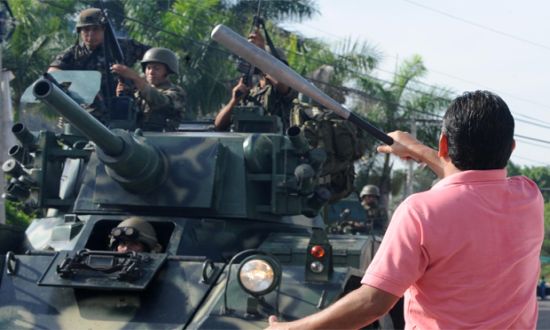 Photo by ALBA TV There has been a lot of speculation about whether the Obama administration was involved in this coup or not. On this question, Andino was very clear: “We think it is impossible for the Honduran Army to have acted without at least tacit approval on the part of US intelligence”.
Photo by ALBA TV There has been a lot of speculation about whether the Obama administration was involved in this coup or not. On this question, Andino was very clear: “We think it is impossible for the Honduran Army to have acted without at least tacit approval on the part of US intelligence”.
All the information that has come out over the last week confirms what we said just after the coup:
“It is clear and public knowledge that the US knew that a coup was being organised. They had had conversations with the leaders of Congress in which the coup had been discussed. The advice from the US had been against taking the step of arresting Zelaya. Probably the US administration, faced with the mass mobilisation on Friday and having learnt some lessons from Venezuela, was not very confident in taking what might be seen as an illegal step and were more in favour of continuing with the script of the “constitutional coup”, leaving the removal of Zelaya for another, more favourable, moment.” (Defeat the reactionary military coup in Honduras – Mass mobilisation in the streets and general strike!)
US ambassador Hugo Llorens had stated on a number of occasions that he was against the consultation being proposed by Zelaya on the possibility of a referendum on a constituent assembly, but he phrased his opposition in typical diplomatic language: “one cannot violate the Constitution in order to create a Constitution”, he said (La Prensa, June 4). This was precisely the argument used by the oligarchy to block Zelaya’s proposed consultation.
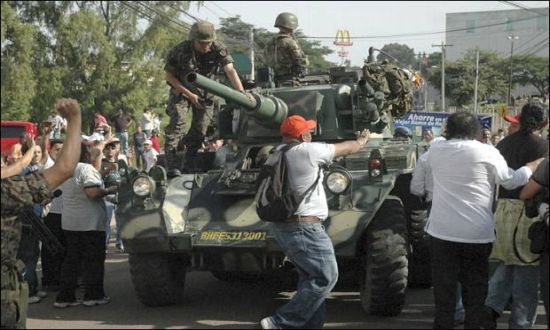 Photo by ALBA TV However, Llorens stressed that: “whatever is finally done, it should be done within the law, within the Constitution”. On June 17, he echoed the arguments of the Honduran capitalists: “The political situation in the country does not help to create an investment friendly climate. Uncertainty in a country does not help investment” (La Prensa). And he added that the dispute about the consultation should be resolved by Congress. What he was saying, loud and clear, was that the US were in favour of a “democratic constitutional coup”.
Photo by ALBA TV However, Llorens stressed that: “whatever is finally done, it should be done within the law, within the Constitution”. On June 17, he echoed the arguments of the Honduran capitalists: “The political situation in the country does not help to create an investment friendly climate. Uncertainty in a country does not help investment” (La Prensa). And he added that the dispute about the consultation should be resolved by Congress. What he was saying, loud and clear, was that the US were in favour of a “democratic constitutional coup”.
Right up to the eve of the coup, US ambassador Llorens was talking to the coup plotters. On June 21, there was a meeting in the US embassy with the presence of president Zelaya, as well as all the coup plotters: Congress president Micheletti, Liberal and National Party presidential candidates Santos and Lobo, and the head of the Armed Forces, Romeo Vásquez. According to the report in the Honduran La Prensa, Zelaya was told that “the best way out of the crisis” would be for him to “cancel the consultation and carry out an opinion poll instead”. (La Prensa, June 22). The very fact that the US ambassador is meddling in the internal affairs of a sovereign country in this manner is a clear indication of the status of Honduras as a “banana republic” dominated by US imperialism. The message to Zelaya was clear: cancel the referendum or else.
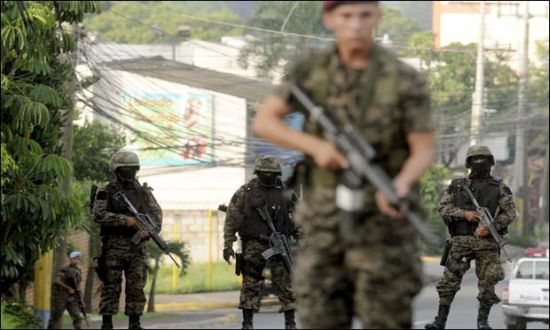 Photo by ALBA TV It would be extremely naïve to think that Llorens did not know of the plans for a coup ‑ in fact this was being openly discussed in the Honduran media in the days leading up to it ‑ and even more naïve to think that he had not reported to Washington. Llorens is not a newcomer, he was nominated as US ambassador to Honduras by the Bush administration and had been Head of Andean Affairs at the National Security Council in 2002 and 2003. This position made him Bush’s main advisor on matters related to Venezuela, Colombia, Bolivia, Peru and Ecuador. He therefore was well aware of the failure of the 2002 coup in Venezuela.
Photo by ALBA TV It would be extremely naïve to think that Llorens did not know of the plans for a coup ‑ in fact this was being openly discussed in the Honduran media in the days leading up to it ‑ and even more naïve to think that he had not reported to Washington. Llorens is not a newcomer, he was nominated as US ambassador to Honduras by the Bush administration and had been Head of Andean Affairs at the National Security Council in 2002 and 2003. This position made him Bush’s main advisor on matters related to Venezuela, Colombia, Bolivia, Peru and Ecuador. He therefore was well aware of the failure of the 2002 coup in Venezuela.
The policy of the new Obama administration regarding Latin America has been one of hiding the stick and mainly waving the carrot. The aims are the same, but after the fiasco of Bush’s bullish policy in the region, Obama is keen to push back the revolutionary wave sweeping the continent by leaning on the “reasonable left” governments in the region. He cannot, therefore, afford the embarrassment of a military coup. Certainly the US administration wanted to remove Zelaya, who had become a thorn in their side, by joining ALBA, siding with Chavez, refusing for months to accept the new US ambassador, Llorens, as a gesture of solidarity with Bolivia (where the US were involved in another attempted coup in September last year) and by generally contributing to a sharpening of the class struggle (“polarisation”) in Honduras with his “irresponsible” statements about the rich and poor, and “freeing the country from imperialism”. They merely preferred to do so by constitutional means.
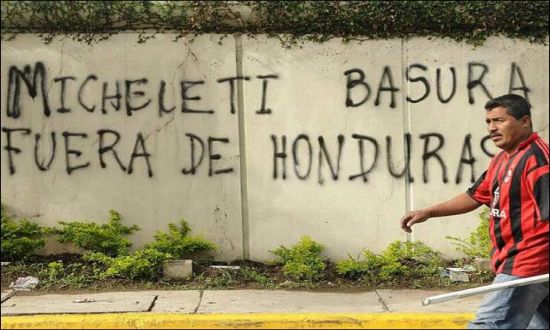 Photo by ALBA TV On June 25 the Honduran congress declared itself in “permanent session”. They were going to carry out the coup by declaring the disqualification of the president. The coup was averted at the last minute with the intervention of Llorens and even, according to some reports, of US Secretary of State Hillary Clinton herself. But this only delayed the coup until Sunday 28, when the army took Zelaya in the middle of the night and put him on a plane to Costa Rica.
Photo by ALBA TV On June 25 the Honduran congress declared itself in “permanent session”. They were going to carry out the coup by declaring the disqualification of the president. The coup was averted at the last minute with the intervention of Llorens and even, according to some reports, of US Secretary of State Hillary Clinton herself. But this only delayed the coup until Sunday 28, when the army took Zelaya in the middle of the night and put him on a plane to Costa Rica.
This was revealed in the lukewarm and belated statements of the Obama administration in the aftermath of the coup. The first official pronouncement of the White House was along the lines of an appeal to “all political and social players in Honduras to respect democratic norms, the rule of law and the tenets of the Inter-American Democratic Charter”. That was an appeal for all players to respect democracy, when some of them had just carried out a coup! It was only after the strongly worded condemnation of the coup by the ALBA member countries, led by Venezuela, that the US was forced to utter the word “coup”, and threatened to curtail military aid to Honduras. However, ambassador Llorens was left in Honduras, in order to keep an open line “with all players”.
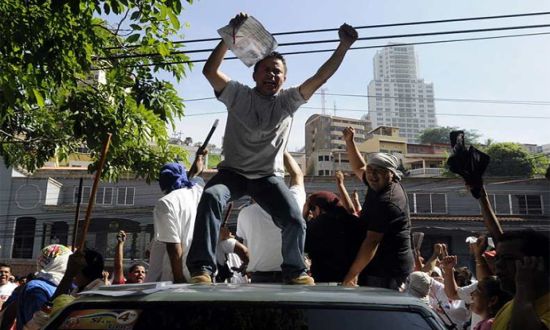 Photo by ALBA TV Even though Zelaya has been in Washington for a few days, neither Obama nor Clinton have thus far met with him, preferring to allow the OAS to deal with the matter. The Organisation of American States has been charged with trying to find a reasonable solution to this mess, one that would save face by bringing Zelaya back, but on the basis of neutralising him – and above all the masses who support him. After all, even if he came back, he does not have control of Congress, nor the Supreme Court, nor the Army, and there are elections scheduled in November in which he cannot legally participate. When Zelaya announced that he was going back to the country on Thursday, July 2nd, the OAS gave the regime a 72-hour ultimatum, thus delaying his return. Then Zelaya announced that he would go back on Saturday 4th, only for OAS general secretary Insulza to announce his own visit to Honduras on that day, delaying Zelaya by one more day.
Photo by ALBA TV Even though Zelaya has been in Washington for a few days, neither Obama nor Clinton have thus far met with him, preferring to allow the OAS to deal with the matter. The Organisation of American States has been charged with trying to find a reasonable solution to this mess, one that would save face by bringing Zelaya back, but on the basis of neutralising him – and above all the masses who support him. After all, even if he came back, he does not have control of Congress, nor the Supreme Court, nor the Army, and there are elections scheduled in November in which he cannot legally participate. When Zelaya announced that he was going back to the country on Thursday, July 2nd, the OAS gave the regime a 72-hour ultimatum, thus delaying his return. Then Zelaya announced that he would go back on Saturday 4th, only for OAS general secretary Insulza to announce his own visit to Honduras on that day, delaying Zelaya by one more day.
But Insulza was met with derision on the part of the coup plotters who announced that, before anyone kicked them out, they would be leaving the OAS. There are certain elements in politics that are never completely under anyone's control. Here we saw the most obtuse representatives of the Honduran oligarchy biting the hand that was offering them a way out.
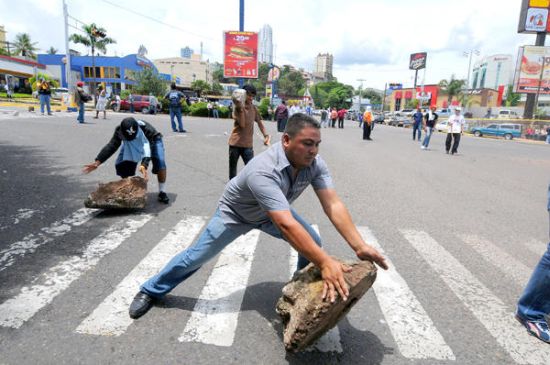 Photo by ALBA TV The Spanish El Pais, always reflecting faithfully the opinions of imperialism, put it quite bluntly last week: “It is urgent to find a way out within the agreed [OAS] deadline, in order to prevent Venezuelan president, Hugo Chavez, from filling the vacuum which might be left afterwards. If the OAS, with US support, does not reinstate Zelaya, the road would then be open for the insurrectionary solution that Chavez is suggesting. The US seems to be conscious of the fact that it is running more risks here than they could have ever imagined in a country like Honduras, and is attempting to be very careful in its moves, so that Zelaya can win but without a victory for what he represents. In other words, without a victory for Chavez and populism”. (El Pais, July 2nd, Ultimátum de la OEA a los golpistas)
Photo by ALBA TV The Spanish El Pais, always reflecting faithfully the opinions of imperialism, put it quite bluntly last week: “It is urgent to find a way out within the agreed [OAS] deadline, in order to prevent Venezuelan president, Hugo Chavez, from filling the vacuum which might be left afterwards. If the OAS, with US support, does not reinstate Zelaya, the road would then be open for the insurrectionary solution that Chavez is suggesting. The US seems to be conscious of the fact that it is running more risks here than they could have ever imagined in a country like Honduras, and is attempting to be very careful in its moves, so that Zelaya can win but without a victory for what he represents. In other words, without a victory for Chavez and populism”. (El Pais, July 2nd, Ultimátum de la OEA a los golpistas)
El Pais, incidentally came out against the coup but supported the reasons for it, after having written a vitriolic denunciation of Zelaya the day before the coup, in an editorial which ridiculed Chavez’s warning that a coup was being prepared in Honduras. (Editorial: Crisis en Honduras, June 26th)
Negotiations and mass action
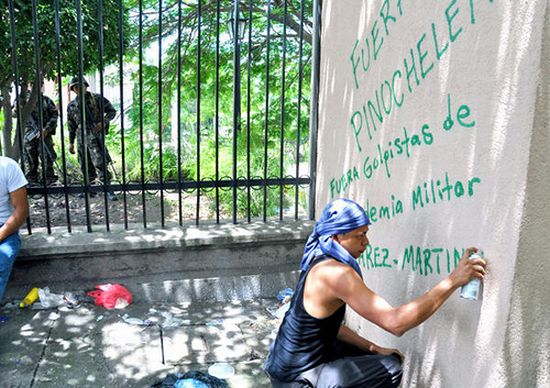 Photo by ALBA TV Nonetheless, in the next few days, more pressure will be exerted on the coup leaders to reach a settlement. This was confirmed today in an article in the Washington Post: “U.S. officials confirmed that Honduras's de facto government had sent a message to the OAS seeking to open negotiations, a move that one official described as positive. 'We think this could create the basis for continuing movement by the OAS on diplomatic initiatives,' one official said.”
Photo by ALBA TV Nonetheless, in the next few days, more pressure will be exerted on the coup leaders to reach a settlement. This was confirmed today in an article in the Washington Post: “U.S. officials confirmed that Honduras's de facto government had sent a message to the OAS seeking to open negotiations, a move that one official described as positive. 'We think this could create the basis for continuing movement by the OAS on diplomatic initiatives,' one official said.”
Tomás Andino, the UD deputy, told us that Carlos Flores was in negotiations with Washington to find a negotiated way out of the current crisis. “They want to bring back Zelaya, but bound hand and foot”. He pointed out that the businessmen fear that if the current efforts do not force the coup plotters to step down they will be faced with an armed mass uprising of the people which would threaten the whole of the capitalist regime.
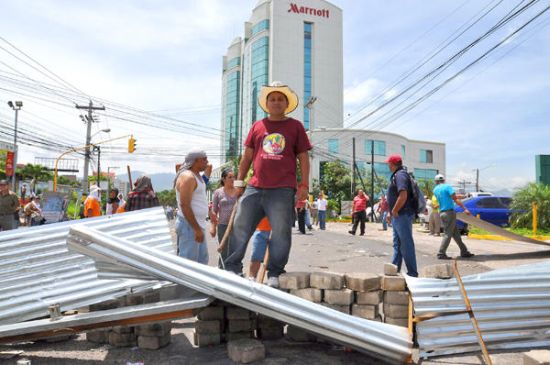 Photo by ALBA TV However, we must be clear on one point: no amount of diplomatic pressure can defeat the coup in Honduras unless the masses of workers and peasants fight for it on the streets as they have done in the last few days. It may even come to pass that Zelaya is returned to Honduras, only for Congress to start proceedings to remove him from the presidency before the end of his term in January.
Photo by ALBA TV However, we must be clear on one point: no amount of diplomatic pressure can defeat the coup in Honduras unless the masses of workers and peasants fight for it on the streets as they have done in the last few days. It may even come to pass that Zelaya is returned to Honduras, only for Congress to start proceedings to remove him from the presidency before the end of his term in January.
Over the last week, the mass movement in Honduras has become broader, more confident and more radicalised. This is precisely what the coup plotters feared, and the reason why they organised the coup. The struggle of the hundreds of thousands of Honduran working people, who have come out on the streets over the last week braving repression, is not only for the reinstatement of the president, but also for the trial and punishment of the coup plotters. Even more than that, it is a fundamental struggle for jobs, bread, land, dignity, and national sovereignty. None of this will be achieved simply with the return of Zelaya alone. If a negotiated settlement is finally reached, this will not satisfy the demands of the masses for justice, and it will certainly not solve the economic and social problems that have pushed them to rally behind Zelaya.
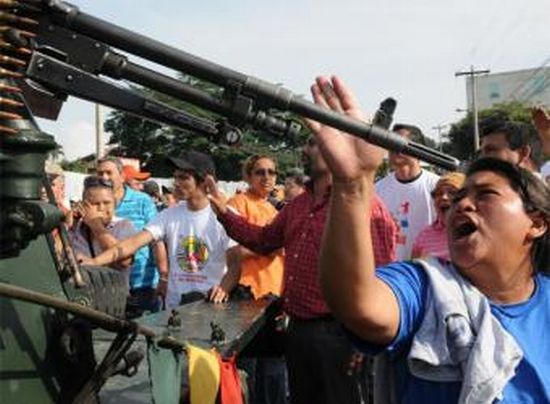 Photo by ALBA TV Speaking to Tomas Aquino, from the Honduras Democratic United Party, he made it very clear that the Peoples’ Resistance Front Against the Coup rejects any kind of negotiation with the coup-plotters and stands for the unconditional reinstatement of the president. He added that the masses of the people have become radicalised through their own experience. “They no longer demand a referendum on the Constituent Assembly, they want a Constituent Assembly full stop, as they are not prepared to deal any more with the political institutions that organised the coup”.
Photo by ALBA TV Speaking to Tomas Aquino, from the Honduras Democratic United Party, he made it very clear that the Peoples’ Resistance Front Against the Coup rejects any kind of negotiation with the coup-plotters and stands for the unconditional reinstatement of the president. He added that the masses of the people have become radicalised through their own experience. “They no longer demand a referendum on the Constituent Assembly, they want a Constituent Assembly full stop, as they are not prepared to deal any more with the political institutions that organised the coup”.
The return of Zelaya, if it does finally take place in the next few days, will only be a real victory for the mass movement if it is achieved without concessions on his part. If so, it will strengthen the resolve of the workers and peasants, it will increase their confidence in their own strength.
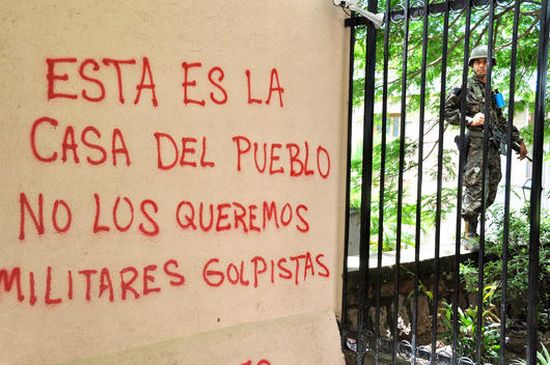 Photo by ALBA TV This last week of struggle has been a very rich school of political education for the masses. Under the whip of repression their political understanding has developed by leaps and bounds. All that Zelaya wanted, apparently, was to carry out a consultation on the possibility of a referendum to decide on a Constituent Assembly! And just because of that, the oligarchy en bloc organised a military-civilian coup. As Andino explained to us, the coup has the support of all traditional political parties, the hierarchy of the Evangelical and Catholic churches, the monopoly mass media groups, the owners of industry, the landowners, the judiciary and the tops of the Army. The whole of the capitalist political establishment is against a minor democratic reform! Because they are terrified of the revolutionary implications of the direct participation of the masses of the workers and peasants in politics. The capitalist system cannot allow it. Andino added that, “what we see is the beginning of a revolution”, and he is correct.
Photo by ALBA TV This last week of struggle has been a very rich school of political education for the masses. Under the whip of repression their political understanding has developed by leaps and bounds. All that Zelaya wanted, apparently, was to carry out a consultation on the possibility of a referendum to decide on a Constituent Assembly! And just because of that, the oligarchy en bloc organised a military-civilian coup. As Andino explained to us, the coup has the support of all traditional political parties, the hierarchy of the Evangelical and Catholic churches, the monopoly mass media groups, the owners of industry, the landowners, the judiciary and the tops of the Army. The whole of the capitalist political establishment is against a minor democratic reform! Because they are terrified of the revolutionary implications of the direct participation of the masses of the workers and peasants in politics. The capitalist system cannot allow it. Andino added that, “what we see is the beginning of a revolution”, and he is correct.
The two main lessons to be learnt from these events are, on the one hand, that the oligarchy in these underdeveloped capitalist countries cannot allow even the most moderate progressive reforms if these are accompanied by a process of politicisation and mobilisation of the masses. They fear the revolutionary consequences of the active participation of the masses in politics. On the other hand it should by now be clear that it is utopian to expect that the institutions of the capitalist state (the judiciary, army hierarchy, mass media, police, etc.), will allow genuine revolutionary change to take place without them stepping in to defend the interests of their masters, the ruling class. This is a serious warning for the revolutionary movement in Bolivia, in neighbouring El Salvador, in Ecuador, etc.
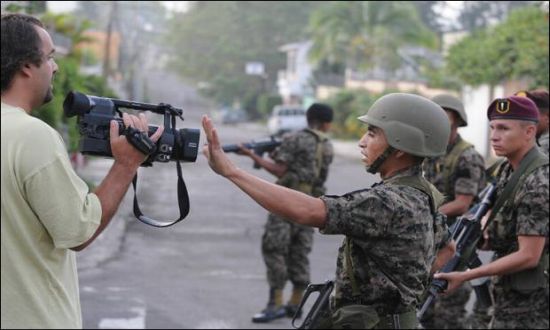 Photo by ALBA TV The only way forward for the movement in Honduras is to continue the mobilisation against the coup. This must be organised and coordinated nationally through committees in every workplace, neighbourhood and village. An appeal must be made to the ranks of the Army, the ordinary soldiers who are also part of the people. Mass demonstrations must be protected by defence committees made up of the workers and peasants themselves. The army generals have already shown what they are capable of, the people cannot face them unprotected. Tomás Andino reported to us lots of different examples of fraternisation of police officers and soldiers with the protestors. These have not yet crystallised in any section of the army openly rebelling, but this could happen in the next few days.
Photo by ALBA TV The only way forward for the movement in Honduras is to continue the mobilisation against the coup. This must be organised and coordinated nationally through committees in every workplace, neighbourhood and village. An appeal must be made to the ranks of the Army, the ordinary soldiers who are also part of the people. Mass demonstrations must be protected by defence committees made up of the workers and peasants themselves. The army generals have already shown what they are capable of, the people cannot face them unprotected. Tomás Andino reported to us lots of different examples of fraternisation of police officers and soldiers with the protestors. These have not yet crystallised in any section of the army openly rebelling, but this could happen in the next few days.
Finally, the main weapon of working people against the oligarchy and the coup is the general strike. Without the permission of the working class not a wheel turns and not a light bulb shines in Honduras. Workers can bring the country to a halt and prevent the coup regime from functioning. Andino reported to In Defence of Marxism that about 60% of public sector workers had participated in the strike against the coup and that this week would see the spreading of the strike movement to the private sector. The call for strike action had been made by the three trade union confederations, all of them part of the Peoples Resistance Front.
Tomás Andino also made an appeal for action to the international working class. “There should be blockades against Honduran products on the part of dockers and transport workers. This can hit the capitalist class where it hurts”.
International solidarity on the part of working people and the labour movement internationally is also crucial. We stand firmly on the side of the Honduran people and against any attempts to water down their fundamental demands.
For the immediate return of Zelaya!
Trial and punishment for the coup plotters!
Full support for the struggle of the people of Honduras!

